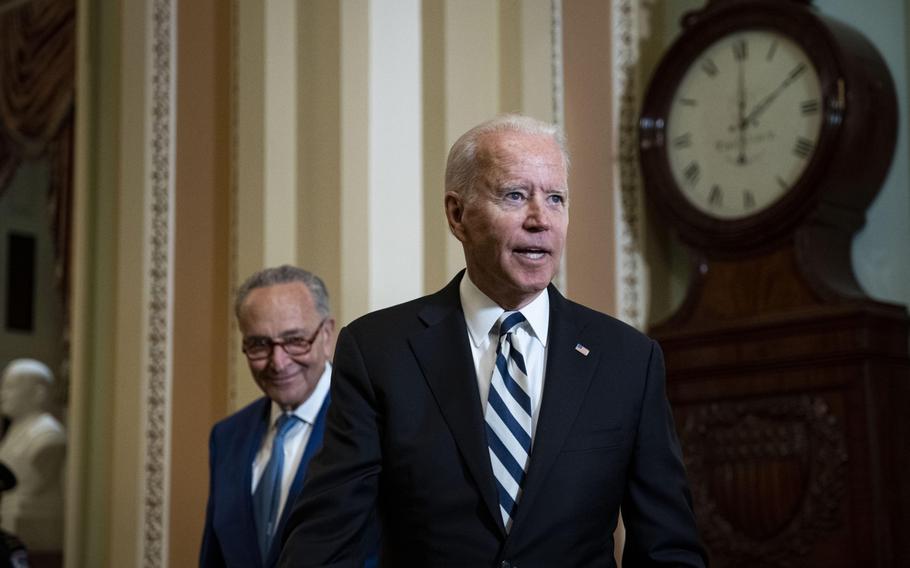
President Joe Biden speaks to members of the media with Senate Majority Leader Chuck Schumer, D-N.Y., at the U.S. Capitol in Washington, D.C., on July 14. (Al Drago/Bloomberg)
President Joe Biden’s decision to bypass Congress and extend the moratorium on evictions for two more months may be unconstitutional, but as a practical matter, keeping it in place through September is reasonable. It will give states and localities time to distribute unspent pandemic relief funds to renters.
Then it should expire on Oct. 3, as scheduled.
When COVID-19 struck in the spring of 2020 and governors started locking down their states, Congress took the unprecedented step of prohibiting properties receiving federal financial assistance or with government-backed financing from evicting tenants. In September 2020, the Centers for Disease Control and Prevention imposed an even more sweeping nationwide ban on evictions.
The reason given at the time for these extraordinary interventions was to slow the pandemic’s spread by avoiding the increase in homelessness and overcrowded housing that would result.
This was a questionable use of federal power, given that state and local governments are responsible for laws regulating housing. And it was a controversial use of government power, period, effectively overriding binding contracts between landlords and tenants.
But given the once-in-a-century pandemic and the fog-of-war atmosphere it created, the action was appropriate. How contagious was COVID-19? How did it spread? How many lives would be put at risk if the homeless population swelled, or if millions of people moved in with extended family? These questions had uncertain answers, and society erred on the side of caution.
Today, because the U.S. has been successful at vaccinating individuals facing the highest risk from COVID-19, the fatality rate is roughly the same as the seasonal flu. Given that vaccines are widely available and that the virus is much less harmful to children than to adults, the U.S. needs to start treating it more like the flu. Policymakers would never impose an eviction moratorium due to the flu.
There are reasons to remain concerned about the plight of low-income renters. According to data from the Census Bureau, between June 23 and July 5 more than 7 million households had fallen behind on rent, including nearly 4 million with children in the home and 2.7 million with income below $25,000 a year.
While a little over 25 million renters reported having confidence they could make their next month’s payment, 12.7 million had no or slight confidence. Roughly the same number of households responded that they were very or somewhat likely to be evicted in the next two months (3.6 million) as not likely (3.7 million).
Ending the eviction moratorium will cause hardship for many households. But that is going to come sooner or later. It is to a large degree a consequence of the moratorium itself: The only way to avoid a substantial number of evictions is if households have saved up to pay their back rent, or are in a position to negotiate a compromise with their landlords. It was always likely that a sizable number of households would have failed to do this.
Keeping the moratorium for a couple of months will only delay the day of reckoning, not avoid it. The new extension should be the last one.
If it holds up legally, state and local governments need to distribute aid from the Emergency Rental Assistance program. Congress has provided $46.6 billion of funding for the program, of which only $3 billion has been spent on rent, utilities and arrears.
That is a huge amount of money, and the Biden administration should make every effort to see that the aid goes to eligible renters over the next two months. Not every needy household is going to be fully bailed out, and many will be hurt when the moratorium expires — there’s no way to avoid this.
Landlords have rights, too, and the longer the situation continues, the less fair it becomes. Moreover, policymakers aren’t doing renters any favors by getting them accustomed to free rent over such a long period of time.
The economy is booming, despite the spread of the delta variant. The lethality of the virus has been greatly reduced. Vaccines are widely available to all adults who want them. If the extraordinary measures made sense for extraordinary circumstances, they no longer do. The extraordinary is becoming ordinary.
Michael R. Strain is a Bloomberg Opinion columnist. He is director of economic policy studies and Arthur F. Burns Scholar in Political Economy at the American Enterprise Institute. He is the author of “The American Dream Is Not Dead: (But Populism Could Kill It).”